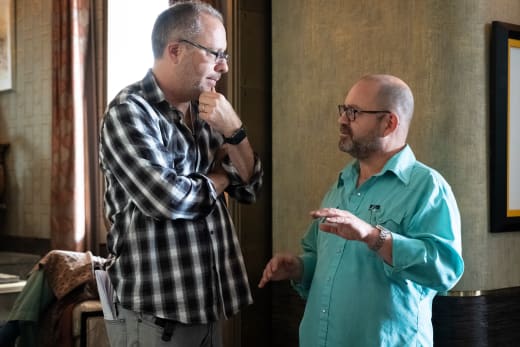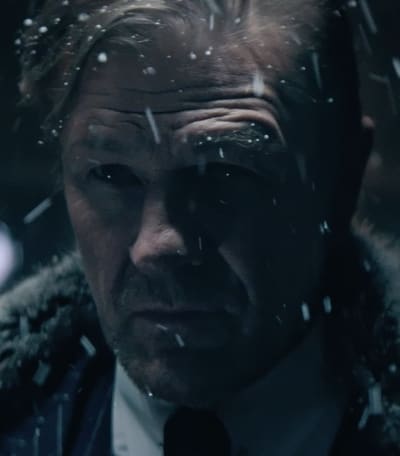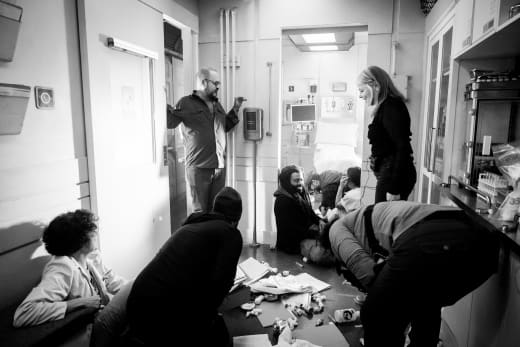In 2018, Graeme Manson, the man who brought to life BBC America’s Orphan Black, faced the daunting task of assuming the reins of TNT’s production of Snowpiercer, a series optioned in 2015 and ordered to pilot a year later.
A pilot had already been shot, but Manson’s vision took the story of the thousand-and-one-car-long train — the last ark of humankind in a world deep in an Ice Age caused by scientists trying to reverse climate change — down a different track from that which had been laid out originally.
The result was a tightly woven narrative and a hugely exciting roller-coaster of a season that managed to solve a mystery, overthrow a regime, and uncover the real damage carried by these last remnants of humanity as they circumnavigate the globe in an attempt to outlast the apocalypse.
Through the magic of technology, TV Fanatic was able to speak to Graeme via phone as he enjoyed a walk through the drizzle of a summer day in Vancouver.
Snowpiercer was greenlit for a second season before the first even premiered. Although they were in production well before the COVID-19 pandemic hit, they weren’t quite able to get it all finished before production was shut down.
Graeme was circumspect about their situation. “We were luckier than a bunch of shows,” he admitted. “We only had about maybe seven or nine days to go. We had the vast majority of our show in the pocket but not done.
“We’re in the process of figuring out how we can get it done. We were in the middle of the last block.”
Snowpiercer’s appeal as a series was in the many potential paths the narrative could take. Throughout the first half of the season, the audience was kept guessing with the mystery of the murder in Third as well as how Layton would play the cards he was dealt.
Graeme liked that the show built a challenging mystery for viewers. “Something to do during this time of COVID,” he joked.
The opportunity to speak to the showrunner was also the irresistible chance to ask about the one ambiguity that’s been bugging this reviewer since the beginning: Who was the first murder victim?
“That there was another murder on the train,” Graeme explained, “We played it more as a pattern for Layton to spot than as something that needed to be pursued in the moment.”
The (short-lived) theory that Wilford had been that first victim with the murder covered up in a hurry seemed to surprise Graeme but not in a bad way.
“People looking for connections… I love that. That’s what you want if you’re trying to build a mystery, build something that’s compelling.”
One of the greatest things Snowpiercer brings to the table is a cast of exceptional actors whose portrayals of their characters always felt completely genuine and whose interplay was wholly believable.
Graeme has a theory about the cohesiveness of the cast. Referring to the long pre-production start, he pointed out they’ve been together as a cast for a year before he was even a part of the show. “They’re a tight cast. They’re close and very supportive of one another. It’s good to see.”
Snowpiercer had one of the most impressive season finales in recent memory.
It finally revealed Melanie Cavill’s personal grief, hinting at all the issues Layton will face in setting up a democratically representative government and then blew everyone’s mind with the arrival of the nearly-mythical Mr. Wilford, a SECOND train, AND Cavill’s thought-dead daughter.
Graeme credits his writing team with the creation of such a spectacular arc. “Kudos to our writing staff who all dug in on ‘How do we build Season Two [and] that final train?’ and we alighted on that pretty early in the season. So every sort of move we were making was towards that.”
On Snowpiercer Season 1 Episode 9, Layton is forced to de-couple a train car filled with friends and fellow rebels, sending them into the cold and to certain death, in order to win the war by Cavill’s plan.
This echoes Layton’s flashback while in suspension in The Drawers on Snowpiercer Season 1 Episode 6 where he relives the execution of the kill cult leader in The Tail. As he tells Till and Pelton on Snowpiercer Season 1 Episode 2, “Each of us ate a piece of his heart so that no one could say they were innocent.”
Graeme weighed in on the deeper meaning of that sentiment. “That statement plays on more levels,” he observed, “I think that plays on the idea that centers on the Night Car, that we’re all traumatized from losing everyone we left behind.
“But deeper than that, it’s the deep guilt that everybody feels for their own culpability because it was climate change that killed the Earth. We always want those things to work on another level.
“And the switching places of Layton and Melanie, that’s part of Layton’s journey. It’s to be faced with that critical leadership decision where you have to sacrifice perhaps those you love for the greater survival of the species.
Layton: You knew I’d have to cut them.
Cavill: I knew the choice would be yours. It’s what we live with every second of our existance. You have the train, Layton.
“And I think it’s at that moment that he really really understands and empathizes with Melanie, understands what she had to go through to give him these horrible reins.”
Jennifer Connelly’s character, Melanie Cavill is revealed to have been the engineer behind the creation of Snowpiercer. She and Lena Hall’s Audrey even discuss how Cavill steered the development of the Night Car into something more than the brothel that Wilford had envisioned.

So how much input did Cavill have in including the instruments of torture, incarceration, and execution used on Snowpiercer?
“Those are Wilford things that Melanie tries to limit the use of,” Graeme clarified, “but the truth is that to keep everything afloat, she had to use those tools of authoritarianism. She had to cross over that line as well.
“When she made that fateful decision to take the train, that’s the weight of choices that she has to carry on there. Before that, the decision that she made that Wilford was incompetent and that the world stood a better chance her? That’s a bold choice.”
The parallels between Snowpiercer’s reality and ours is not lost on this showrunner.
“It also can be seen, certainly in this time, [that] she made a choice as a scientist against someone she is calling a fraud. Now, does that sound familiar?”
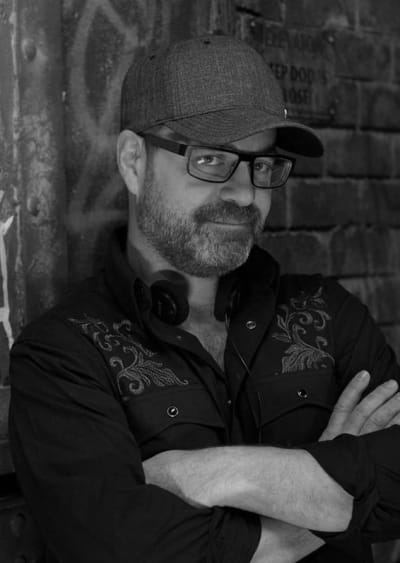
The class system of Snowpiercer is another major theme that resonates with real-life happenings. In an environment where keeping the order is paramount, those charged with keeping the peace hover between or outside the class structure.
Asked about how the jackboots fit in, Graeme explained it simply. “I think they’re a military class that’s stationed throughout the train with the brass in the upper class. Much like the brakemen have their garrison.”
In looking at how characters developed throughout the season, Bess Till, the brakemen-turned-rebel, was the obvious example of dynamic change and growth.
“She’s definitely one of those characters that we wanted to grow to understand slowly and there’s a couple of those characters — you can’t do everything in one season — that we wanted to get to know more before digging into their deeper stories.
“Definitely her and Roche. Pike, too.”
#Snowpiercer perfect day for a long con @StevenOgg #SanDiegoComicCon2019 @SnowpiercerTV pic.twitter.com/z2FS3Njvm5
— Graeme Manson (@GraemeManson1) July 20, 2019
When informed that Steven Ogg, the actor who plays Pike, had been ambiguous about how much backstory we get on his character in our recent interview, Graeme respected that choice.
“Writers come up with their own little things, but you never want to be prescriptive. I think that’s interesting because everybody got onto this train in a hurry, and I always thought people could shed their identities to become something completely new. I thought everybody could be transformed in some way.
“If you came in oppressed or of a lower class and you had the opportunity to rise in the structure of the train? We have a number of characters who do that. There are characters on Snowpiercer who are doing better than they did before the Freeze.”
Asked where he thought the season pivoted towards its true course in terms of characters’ transformations, he felt it was very near the end where we see true change emerge.
“It might be [Snowpiercer Season 1 Episode 9] for me. That, to me, is the episode where the shoe’s on the other foot between Melanie and Layton. It’s always an interesting challenge to put your two foes together by the end of a season so that was always an idea that the writers were shooting towards.
“And the idea to reveal Wilford then, upon that moment where Melanie believes that she is off to the Engine to live happily as an engineer and a scientist and leave the running of the train to Layton who is going to do his best to build a democracy which is always difficult at best.
“[It’s like throwing] the Ghost of Christmas Past onto that scenario…”
Turning to Season 2, Manson was understandably general about the direction the show would take with the introduction of another train and the return of Mr. Wilford.
Big Alice, as the second train is known as, was designed as a supply train, a prototype that predated Snowpiecer. Without being fitted with the amenities of a passenger train, what has life been like there for the past seven years?
“That’s one of the big mysteries for next year. And also, in terms of the design of the show, the sense of always being able to open a door and find something surprising. We really like the challenge visually for the show to bring in another train.
“For a writer, it poses too great a cliffhanger to spoil what it’s like over there. We want it opaque, and I will say that it’s hard to understand. It’s hard to read that train once we do get aboard it. It’s a mysterious place over there.
“In terms of Wilford, not only is he this great sort of Oz- or Wonka-type character, his myth precedes him. We now know the backstory with Melanie, and as we realize that’s Melanie’s daughter on his train, [we’re] rightfully fearing for Melanie and all of Snowpiercer. I think it was certainly the right place to leave them [in the finale].
“It also leaves that shred of hope for Melanie that she gets to see her daughter again. At least, that’s hope for the audience.”
As the season opened and closed with a graphic animation that threw back visually to the graphic novel origin of Snowpiercer, it made sense to ask if we could expect to see any of the more outrageous adventures from the source material appear in the television series.
“The graphic novels take us through tremendously philosophical and absurdist trips, but they introduce these amazing concepts of multiple trains, which I think is just terrific for the storytelling on Snowpiercer.
“I like that Snowpiercer could someday discover the underground bunker with the people who wear the mice helmets. I don’t know that that’s going to be this Snowpiercer, but it could be a Snowpiercer. You know what I mean?”
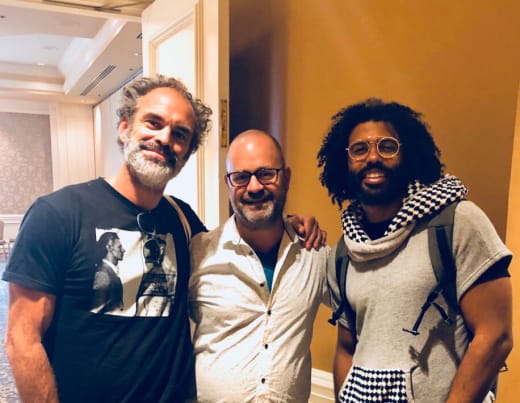
The Tailies of Snowpiercer live in windowless cars and survive on rations of bug bars for calories. So when we see them eat actual food, it’s an event.
In fact, it happens so rarely, the question begged to be asked whether the writers had made food indicative of the character’s nature. For example, we learn early that Layton’s favorite food is grilled cheese and tomato soup, a simple and nutritious meal.
In contrast, Pike’s first meal out of The Drawers is far more decadent, including the olive oil chocolate cake he describes as having “this great mouth feel,” and chocolate milk.
Graeme included his own example of “Josie taking great pleasure in a mouthful of oatmeal” which speaks to Katie McGuinness’s character’s wholesome, mothering nature.
His thoughts on the food scenes are that “those are those tactile moments that you love to give to your characters especially in a world where they are so deprived.”
“Then again,” he continued, “it speaks to what we touched on earlier. You can understand Pike’s aspirations after being in The Tail.
“That’s all you need to know about him. He’s been in The Tail for [seven] years. You can understand, even if it’s not what you’d do, someone who’d just go, ‘I would give it all up for a piece of cake.’
“It seems true to Pike. And also, Pike and Layton have a nice frenemy relationship that we’ve teased along here in the first season. We’re going to look forward to doing all that again. That’s for sure.
There’s a strange and disquieting balance in the fact that the season ends with Melanie’s daughter arriving just when LJ’s parents have been sent into the cold. It leaves things very uncertain for the train’s number one castrating murderer.
Orphaned, and effectively homeless, she finds a sympathetic soul in the unlikely person of Brakeman Osweiller on Snowpiercer Season 1 Episode 10.
What does the future hold for Lilah Junior?
“Annalise [Basso] has just embraced that character. It’s been a lot of fun to play with crazy. But she’s got nothing now except for this blossoming friendship with Osweiller, so she’s got some growing up to do.

“It’s always nice to take a character and break them down and see how they come out. I’ve got a feeling she’s a pretty resilient… psychopath.”
As LJ is still considered First Class and has demonstrated a complete lack of life skills, where will she fit in now that Mr. Wilford has returned and a new New Order looms?
Graeme’s spoiler sensor went off at this point, and his answer was coy. “We’ll have to see. Whether it’s a contribution or a detriment, we’ll find out next year with those two.”
Generalizing the question of how any of First Class can justify their lives, Graeme does confirm, “That is the business with Season 2.”
Snowpiercer Season 2 is expected to air in 2021 on TNT.
Diana Keng is a staff writer for TV Fanatic. Follow her on Twitter.


